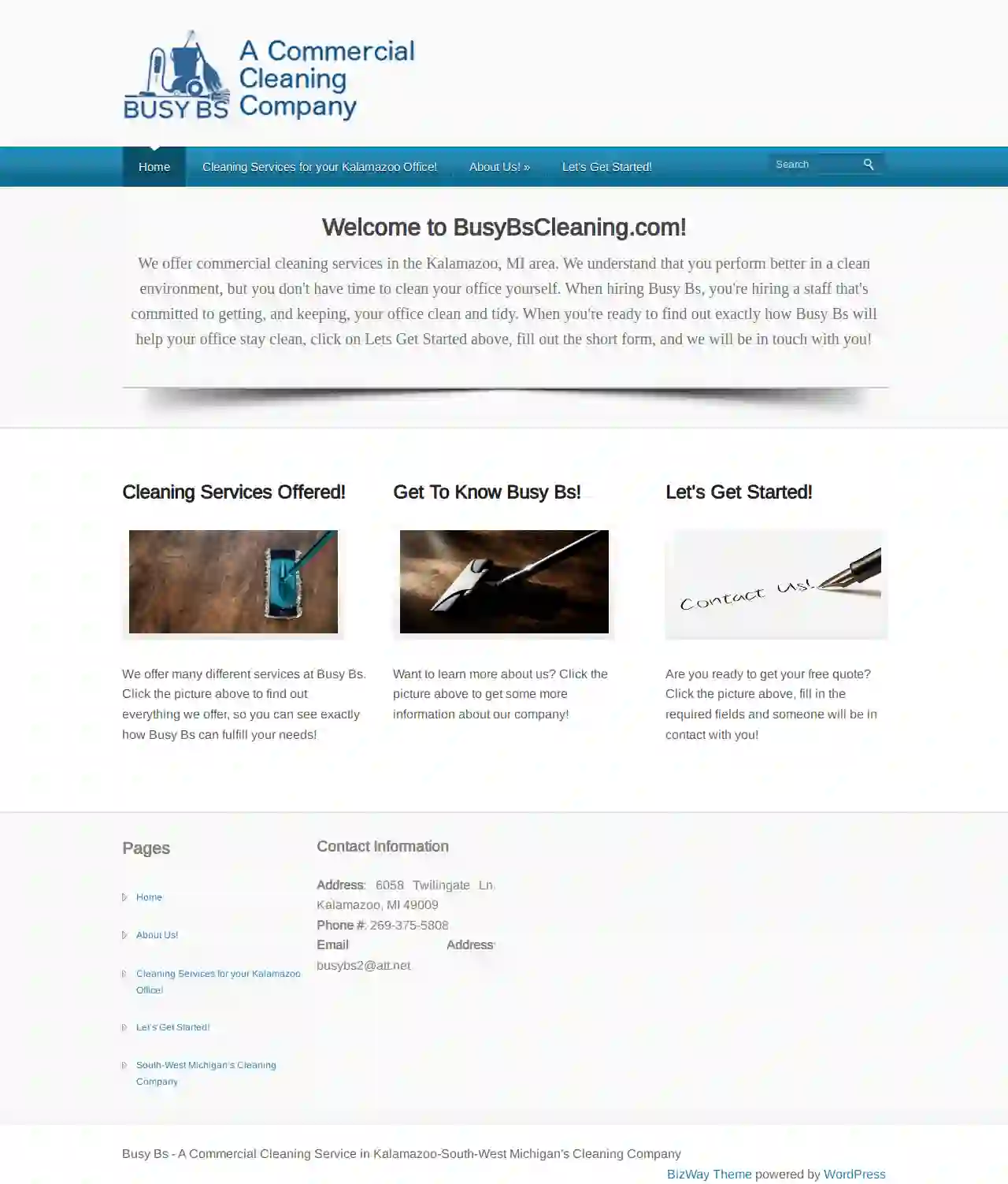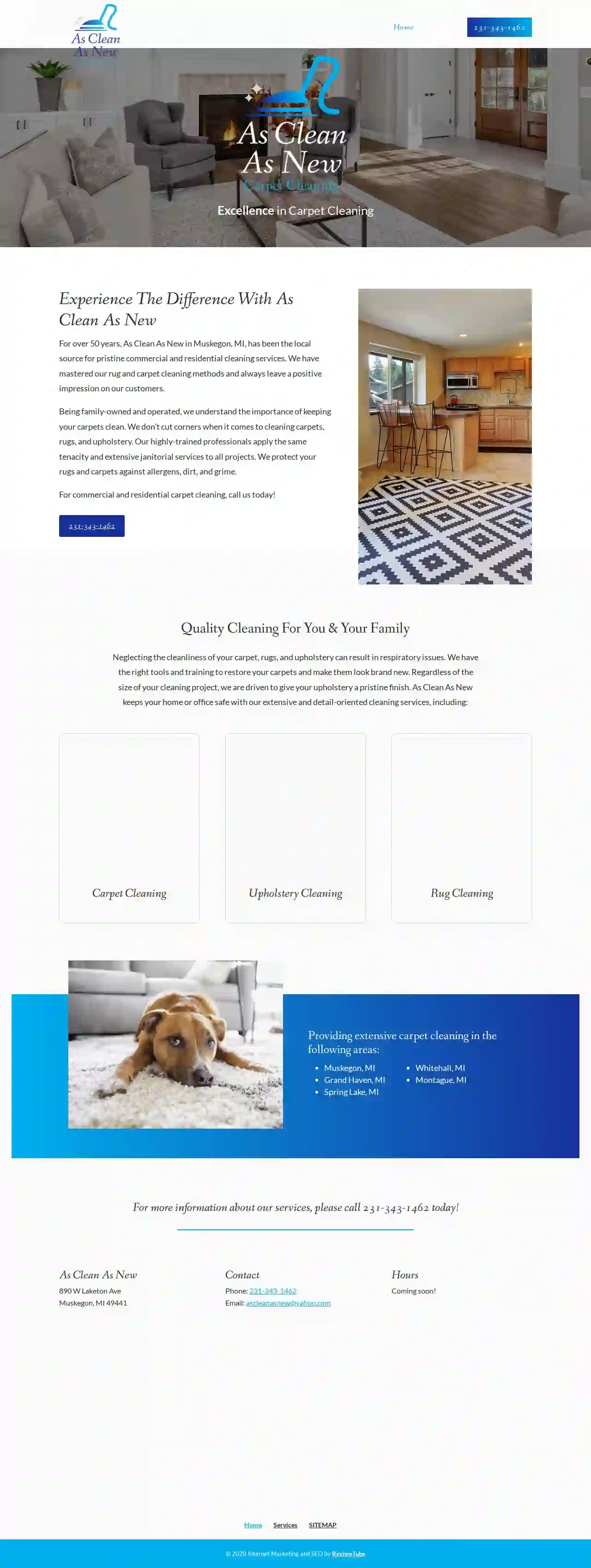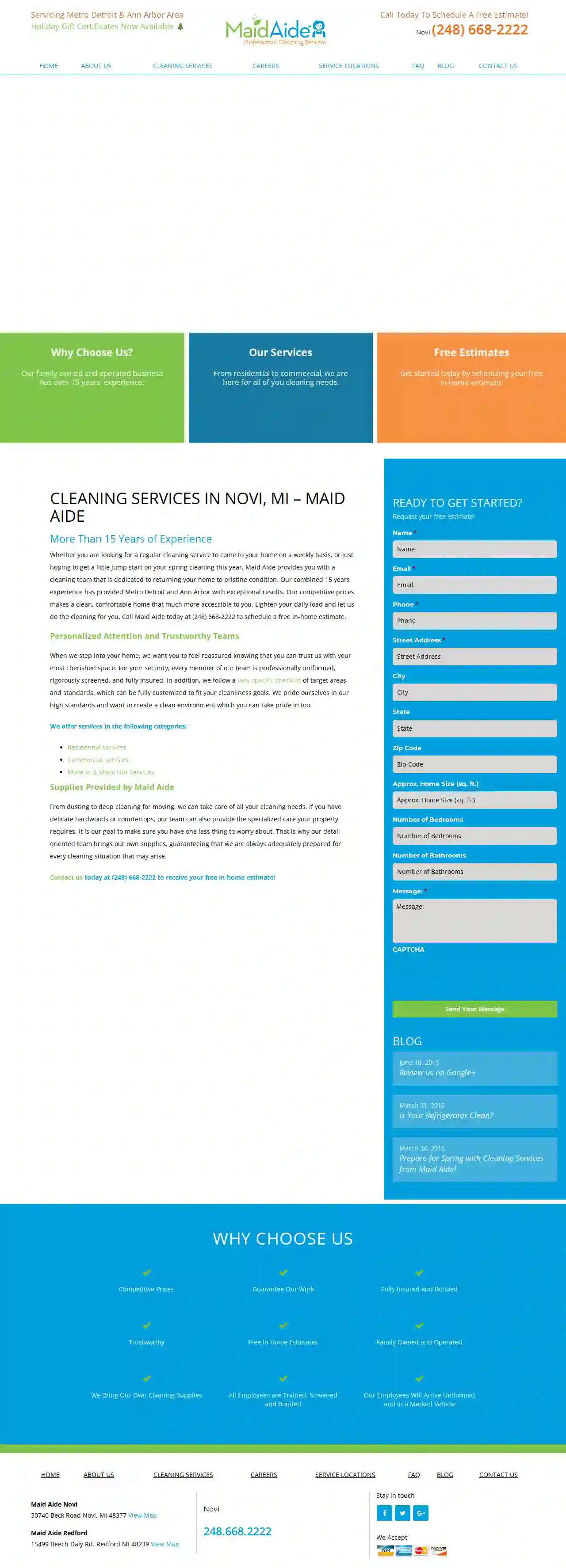Cleaning Services Birmingham
Find top Professional Cleaners in Birmingham
Receive up to 3 Local Cleaners quotes for your project today! Compare profiles, reviews, accreditations, portfolio, etc... and choose the best deal.

Clean By Design
589 reviewsKalamazoo, US- Services
- Why Us?
- Gallery
Get Quote
Busy Bs
6058 Twilingate Ln., Kalamazoo, 49009, USBusy Bs Cleaning is a commercial cleaning service based in Kalamazoo, MI, serving the South-West Michigan area. Our team is committed to providing a clean and tidy environment for your office, allowing you to focus on your work. With a range of services offered, we can fulfill your specific cleaning needs. At Busy Bs, we understand the importance of a clean workspace and its impact on productivity. Our staff is dedicated to delivering exceptional cleaning services, ensuring your office remains clean and organized. Whether you're looking for a one-time deep clean or regular maintenance, we've got you covered.
- Services
- Why Us?
- Gallery
Get Quote
Sort of Stephanie Commercial Janitorial Services
4.715 reviewsWixom, MI, 47620 West Rd., 48393, USSort of Stephanie is a woman-owned janitorial service company located in Wixom, Michigan, providing superior building and janitorial services to cities around southeastern Michigan. Our mission is to provide impeccable service to our communities by hiring, developing, and retaining passionate and dedicated individuals who, together, create a lifetime of remarkable experiences. We offer a wide range of services including reoccurring nightly services, day porters, and more. Our values, team, and passion for outstanding work set us apart. We promise to eliminate concerns about your service with our unique 'Helping Hand Method' which includes the Triangle Of Trust, Dream Team Selection, Precise Detailed Approach, Rapid Response, and Respect Policy. We are dedicated to making your workspace shine and providing you with a cleaning partner that makes your life easier.
- Services
- Why Us?
- Accreditations
- Our Team
- Testimonials
- Gallery
Get Quote
Clean Team - Detroit
4.719 reviewsDetroit, US- Services
- Why Us?
- Gallery
Get Quote
As Clean As New
4.825 reviewsMuskegon, US- Services
- Why Us?
- Gallery
Get Quote
Maid Aide
4.583 reviewsDetroit, US- Services
- Why Us?
- Gallery
Get Quote
Detroit Cleaning Pro
4.98 reviews123 Main St, Detroit, 48201, USAt Detroit Cleaning Pro, we pride ourselves on providing top-notch cleaning services to our clients. Our team of experts has years of experience in the industry and is dedicated to delivering exceptional results. We use only the highest quality equipment and eco-friendly cleaning solutions to ensure a safe and healthy environment for our clients. Our mission is to provide a stress-free cleaning experience that exceeds our clients' expectations. We serve the Detroit area and surrounding communities, and we're committed to building long-term relationships with our clients. Our team is fully trained and equipped to handle any cleaning task, from one-time deep cleans to regular maintenance cleaning. We're proud to be a locally owned and operated business, and we're committed to giving back to our community. Contact us today to schedule your cleaning service and experience the Detroit Cleaning Pro difference.
- Services
- Why Us?
- Gallery
Get Quote- Af
Affordable 1 Facility Services, Corporation
56 reviewsAnn Arbor, US- Services
- Why Us?
Get Quote - YQ
YQG Cleaning Services
510 reviewsDetroit, US- Services
- Why Us?
Get Quote - Co
Coverall of Detroit
321 reviewsDetroit, US- Services
- Why Us?
Get Quote
Over 60,241+ Cleaning Services on our platform
Our cleaning pros operate in Birmingham & surroundings!
CleaningMatch has curated and vetted the Best Janitorial Services near Birmingham. Find the most reliable pro today.
Frequently Asked Questions About Cleaning Services
- Ventilation: Open windows and turn on the exhaust fan to improve air circulation.
- Declutter: Remove any items from countertops, the shower, and the floor to allow easy access.
- Pre-treat: Spray shower walls, tub, and toilet bowl with bathroom cleaner and let it sit for a few minutes to break down grime.
- Toilet: Scrub the toilet bowl with a toilet brush, paying attention to the rim and under the seat. Wipe down the exterior of the toilet with a disinfectant wipe.
- Shower/Tub: Scrub the shower walls and tub with a sponge or scrub brush. Rinse thoroughly.
- Sink: Clean the sink with a sponge or cloth and bathroom cleaner. Pay attention to the faucet and drain.
- Mirrors and Glass: Wipe down mirrors and glass surfaces with a glass cleaner and a microfiber cloth for a streak-free finish.
- Floors: Sweep or vacuum the floor, then mop with a floor cleaner designed for your bathroom floor type.
- Finishing Touches: Empty the trash can, replace towels, and put away any toiletries.
- Experience: 'How long have you been in business, and what type of cleaning services do you specialize in?'
- Licensing and Insurance: 'Are you licensed, insured, and bonded? Can I see proof of coverage?'
- Background Checks: 'Do you conduct background checks on your employees?'
- Cleaning Supplies: 'Do you provide your own cleaning supplies and equipment, or should I provide them?'
- Cleaning Methods: 'What cleaning methods and products do you use?'
- References: 'Can you provide references from previous clients?'
- Scheduling and Availability: 'What days and times are you available for cleaning?'
- Pricing and Payment: 'What is your pricing structure, and what payment methods do you accept?'
- Cancellation Policy: 'What is your cancellation policy?'
- Satisfaction Guarantee: 'Do you offer a satisfaction guarantee? What happens if I'm not happy with the service?'
- Declutter Regularly: Set aside time regularly to declutter your belongings. Donate, sell, or discard items you no longer use or need.
- Designated Storage: Assign specific storage spaces for different items, such as shelves for books, drawers for clothes, and containers for toys.
- Labeling: Label storage containers and drawers to make it easy to find items and put them back in their designated places.
- 'One In, One Out' Rule: For every new item you bring into your home, get rid of an old one. This prevents clutter from accumulating.
- Vertical Storage: Utilize vertical storage solutions, such as shelves, wall organizers, and hanging racks, to maximize space.
- Digital Organization: Organize digital files and emails to reduce paper clutter. Use cloud storage services to free up space on your computer.
- Using the wrong cleaning products: Certain cleaning products are unsuitable for specific surfaces. Using abrasive cleaners on delicate surfaces can cause scratches or discoloration.
- Not reading product instructions: Always read and follow the instructions on cleaning products to ensure proper usage and avoid potential hazards.
- Using dirty cleaning tools: Dirty cloths, sponges, and mops can spread germs and dirt instead of cleaning them. Rinse and sanitize your cleaning tools regularly.
- Skipping ventilation: Proper ventilation is essential when using cleaning products, especially those with strong fumes. Open windows and doors to allow fresh air circulation.
- Not allowing sufficient drying time: After cleaning, allow surfaces to dry completely to prevent mold and mildew growth, particularly in humid areas like bathrooms.
- Ignoring clutter: Clutter makes cleaning more difficult and time-consuming. Declutter regularly to maintain a cleaner and more organized home.
What is the best way to clean a bathroom?
By following these steps, you can maintain a clean and hygienic bathroom.
What should I ask a cleaning service before hiring them?
By asking these questions, you can assess their professionalism, reliability, and suitability for your cleaning needs.
What are some tips for keeping my home organized and clutter-free?
By adopting these strategies, you can create a more organized and clutter-free home, promoting a sense of calm and efficiency.
What are some common cleaning mistakes to avoid?
By avoiding these common cleaning mistakes, you can improve your cleaning efficiency and achieve better results.
What is the best way to clean a bathroom?
- Ventilation: Open windows and turn on the exhaust fan to improve air circulation.
- Declutter: Remove any items from countertops, the shower, and the floor to allow easy access.
- Pre-treat: Spray shower walls, tub, and toilet bowl with bathroom cleaner and let it sit for a few minutes to break down grime.
- Toilet: Scrub the toilet bowl with a toilet brush, paying attention to the rim and under the seat. Wipe down the exterior of the toilet with a disinfectant wipe.
- Shower/Tub: Scrub the shower walls and tub with a sponge or scrub brush. Rinse thoroughly.
- Sink: Clean the sink with a sponge or cloth and bathroom cleaner. Pay attention to the faucet and drain.
- Mirrors and Glass: Wipe down mirrors and glass surfaces with a glass cleaner and a microfiber cloth for a streak-free finish.
- Floors: Sweep or vacuum the floor, then mop with a floor cleaner designed for your bathroom floor type.
- Finishing Touches: Empty the trash can, replace towels, and put away any toiletries.
By following these steps, you can maintain a clean and hygienic bathroom.
What should I ask a cleaning service before hiring them?
- Experience: 'How long have you been in business, and what type of cleaning services do you specialize in?'
- Licensing and Insurance: 'Are you licensed, insured, and bonded? Can I see proof of coverage?'
- Background Checks: 'Do you conduct background checks on your employees?'
- Cleaning Supplies: 'Do you provide your own cleaning supplies and equipment, or should I provide them?'
- Cleaning Methods: 'What cleaning methods and products do you use?'
- References: 'Can you provide references from previous clients?'
- Scheduling and Availability: 'What days and times are you available for cleaning?'
- Pricing and Payment: 'What is your pricing structure, and what payment methods do you accept?'
- Cancellation Policy: 'What is your cancellation policy?'
- Satisfaction Guarantee: 'Do you offer a satisfaction guarantee? What happens if I'm not happy with the service?'
By asking these questions, you can assess their professionalism, reliability, and suitability for your cleaning needs.
What are some tips for keeping my home organized and clutter-free?
- Declutter Regularly: Set aside time regularly to declutter your belongings. Donate, sell, or discard items you no longer use or need.
- Designated Storage: Assign specific storage spaces for different items, such as shelves for books, drawers for clothes, and containers for toys.
- Labeling: Label storage containers and drawers to make it easy to find items and put them back in their designated places.
- 'One In, One Out' Rule: For every new item you bring into your home, get rid of an old one. This prevents clutter from accumulating.
- Vertical Storage: Utilize vertical storage solutions, such as shelves, wall organizers, and hanging racks, to maximize space.
- Digital Organization: Organize digital files and emails to reduce paper clutter. Use cloud storage services to free up space on your computer.
By adopting these strategies, you can create a more organized and clutter-free home, promoting a sense of calm and efficiency.
What are some common cleaning mistakes to avoid?
- Using the wrong cleaning products: Certain cleaning products are unsuitable for specific surfaces. Using abrasive cleaners on delicate surfaces can cause scratches or discoloration.
- Not reading product instructions: Always read and follow the instructions on cleaning products to ensure proper usage and avoid potential hazards.
- Using dirty cleaning tools: Dirty cloths, sponges, and mops can spread germs and dirt instead of cleaning them. Rinse and sanitize your cleaning tools regularly.
- Skipping ventilation: Proper ventilation is essential when using cleaning products, especially those with strong fumes. Open windows and doors to allow fresh air circulation.
- Not allowing sufficient drying time: After cleaning, allow surfaces to dry completely to prevent mold and mildew growth, particularly in humid areas like bathrooms.
- Ignoring clutter: Clutter makes cleaning more difficult and time-consuming. Declutter regularly to maintain a cleaner and more organized home.
By avoiding these common cleaning mistakes, you can improve your cleaning efficiency and achieve better results.